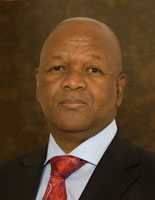
Subscribe & Follow
Jobs
- Junior Medical Device Sales Executive Cape Town
- Independent Sales Agent Mbombela
- Communications Clerk Tshwane
- Warranty Assessor George
- National Sales Manager - Radio Sales Johannesburg
- Chief Marketing Officer (CMO) Cape Town
- Motor Insurance Claims Consultant George
- Sales and Service Consultant George
- Insurance Sales Consultant George
- Ad Traffic Intern Cape Town
Traditional Courts Bill must pass constitutional test - Radebe

Radebe allayed the fears that the bill would discriminate against rural women when he answered questions from University of Cape Town (UCT) students, who gathered at the university's Molly Blackburn Hall to hear his address.
He also stressed that the bill was still before Parliament - at the National Council of Provinces (NCOP) - and that changes and additions could still be made.
"There's no one in government, including the Department of Justice, who wants the continuation of discrimination on the basis of race and gender.
"So all those issues that have been raised, especially about (that the bill would discriminate against) women... We fully ascribe to those principles because the Constitution will not allow that... discrimination on the basis of race and gender is not permitted by our Constitution," said Radebe.
Students voiced concerns that the bill appeared to be using the same boundaries of apartheid homelands, that the bill gave chiefs too much power particularly against rural women and that traditional courts would have the power to sentence accused in absentia.
Radebe also pointed out that the bill didn't create traditional courts in South Africa, as these already existed.
The bill, he said, had been introduced as the Constitution recognised customary law and traditional leadership.
Traditional courts were still being administered by an apartheid law, the Black Administration Act of 1927 and therefore this needed to be aligned with the Constitution, he said.
In his address to over 200 students on the challenges of access to justice, Radebe said important comments had been made by UCT students on the bill, as well as on the Constitution17th Amendment Bill and the Superior Courts Bill - which also aimed to transform the justice system.
He hoped Parliament would consider these submissions.
He said access to justice didn't only constitute having access to an affordable lawyer and speedy trial, but needed to be backed up by laws that promoted equality and the rule of law, with an independent judiciary and courts that were impartial.
Access to justice was vital given the country's divided colonial and later apartheid past when justice, he said, was only accessible to the well off.
The Justice Department, however, would help craft the ideal society that South Africans desired, he said.
He said the department was in the process of capacitating the office of the chief justice which would enhance the independence of the judiciary.
The office, he said, would hold the same power as that of a director-general's office.
The government's Justice, Crime Prevention and Security Cluster was also reviewing the role of courts to see that court processes were easy and simple to use.
While two new high courts would soon be opened in Mpumalanga and Limpopo, Radebe said, the expansion of Small Claims Courts, which handled claims of up to R12 500, had also allowed more people to have access to justice.
The Legal Professions Bill, introduced recently in Parliament, would enhance access to affordable legal services, he said, adding that Legal Aid would continue to offer free legal services to those that could not afford legal representation.
A case-flow management system would be introduced in the courts system, which would help speed up the case resolution rate, he said.
















